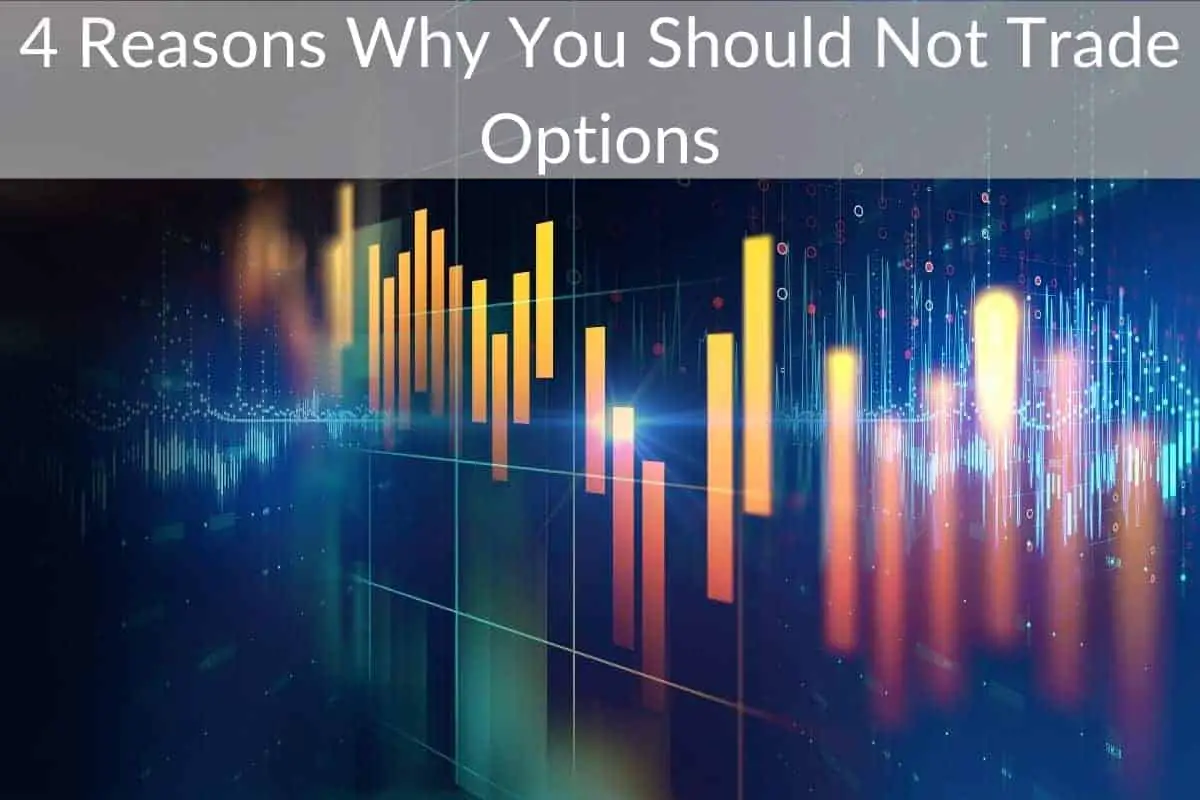Table of Contents
*This post may contain affiliate links. As an Amazon Associate we earn from qualifying purchases.
If you’re new to the trading scene, you might not understand options as well as you should just yet. It’s best to learn everything you can about an investment before making important decisions about it.
There’s plenty of reasons not to trade options, which many new investors don’t realize.
Here are reasons why you should not trade options:
- Taxes on gains.
- High commission rates.
- Uncertain value gains.
- Fluctuations in value.
Overall, you need to have an understanding of call and put options before making a trade. It’s complicated and comes with several downsides you’d have to navigate.
Keep reading if you want to learn about all the reasons you shouldn’t trade options!
1. Taxes on Gains
To start, all of the gains you make will have a tax associated with them. This tax applies to all short-term capital gains you make from trading the options.
According to Schwab, the current tax for short term capital gains is your current tax bracket. So you could easily lose 20-30% (or more) on the sale of your options just to taxes.
When you hold the option for less than a year, your trade results in a “short-term gain or loss,” impacting your income. If you keep it for longer than a year, this will show up on your taxes as a “long-term gain or loss,” according to Intuit TurboTax.
When you exercise an option, there’s usually no taxes associated with it. Many investors choose this as the better option when compared with trading. You save money and don’t have to pay out on your gains.
Because of this, you can earn even more money when you exercise an option.
2. High Commission Rates
There’s also plenty of commission rates that you’ll have to consider. Commissions on options are usually very high, especially if they expire in a week. If you find a broker that doesn’t list their commissions in an easy-to-find place, you’re likely paying a lot more than you might think.
SmartAsset says that the average fee for options trading falls between $0.65 and $1 per contract.
While that seems low at first, remember that options usually contain several contracts. The fee is often higher when you work with traditional brokers. Overall, you could spend over $100 on executing trades if you use a traditional broker.
Many investors find that trading options just aren’t worth it after they’ve paid all of the commission fees. You’ll want to consider this before you start trading because you could quickly lose all of your profits between taxes and commission rates.
However, if you hold them longer or you only trade a few options, you might save a little money on fees.
You can also use discount brokerages to save some money. Currently Robinhood, Firstrade, and other online brokers allow you to trade options for free.
3. Uncertain Value Gains
This is the most important reason why you should not trade options (and where many beginner option traders get into trouble).
There’s a level of uncertainty that comes with options trading. Many investors need to learn about risk, loss, and reward before they can benefit from options. You’ll have to track gains and losses on the option so you know what to expect on the expiration date.
Since such a large percentage (75%) of option contracts sold goes unexercised that means you have a 75% chance of losing money if you hold your options until the day they expire.
When options expire, you also may not receive the gains you expected.
This fact leaves a lot of uncertainty with trading options. Implied volatility can fall or rise at any time, which means that there can be times when the stock does what you want, but you still don’t get the reward you thought you would.
Because of this, many people choose not to make options a significant part of their portfolios. However, if you don’t mind uncertainty with your money, you can still profit from owning them.
Understanding Time Value
The value of your option changes as time passes due to the set expiration date.
You can always sell before the expiration date if you think this would be a good choice. Out of the money, options don’t have any value when the expiration date arrives. However, that’s not true for in-money options.
In-money options can be sold or exercised before the expiration date to earn a profit. However, you still don’t want to trade them. You can lose 100% of your investment unless you have a solid, reliable plan in place.
Additionally, Nasdaq says that your odds of “winning” the trade is at 50% which isn’t great.
At that rate, you have equal odds of losing money and gaining money. For many investors, those odds aren’t good enough to consider the risks of trading options. Plus, they may not make enough of a profit for it to be worth the risk of losing their entire investment.
4. Fluctuations in Value
Next, it’s important to remember that options are a leveraged investment. That means your portfolio can see extreme fluctuations in value, which may cause you a lot of stress.
Most people don’t want to experience a lot of volatility in the value of their investments. If that sounds like something you don’t want to deal with, make sure to avoid trading options.
You won’t have to account for fluctuations in your portfolio that way.
If you need to understand this more, I recommend that you read Options as a Strategic Investment by Lawrence G. McMillan. This book provides you with plenty of strategies for using options and details exactly how they work.
If you’re interested in options you’ll need to know everything about them before you try to use them. They’re a very complex investment form.
Why Options Trading Is a Bad Idea
There are plenty of reasons why you shouldn’t trade in options. You don’t want to deal with too much uncertainty with your money. Plus, a lot of your gains need to go towards commission fees and taxes.
You may not be left with much profit when you finish paying for those.
While the disadvantages outlined here might hold you back, if you know what they are, you can better avoid them. Many investors feel that these downsides outweigh the possible rewards of options trading, so they never get involved.
Overall, it’s generally not worth it for most investors to get into trading options. However you will want to make sure you stay informed on the topic so that you can take advantage of all the investment options available to you.
If you need to learn more about options, make sure to read more by clicking the “options” link on the menu above.

